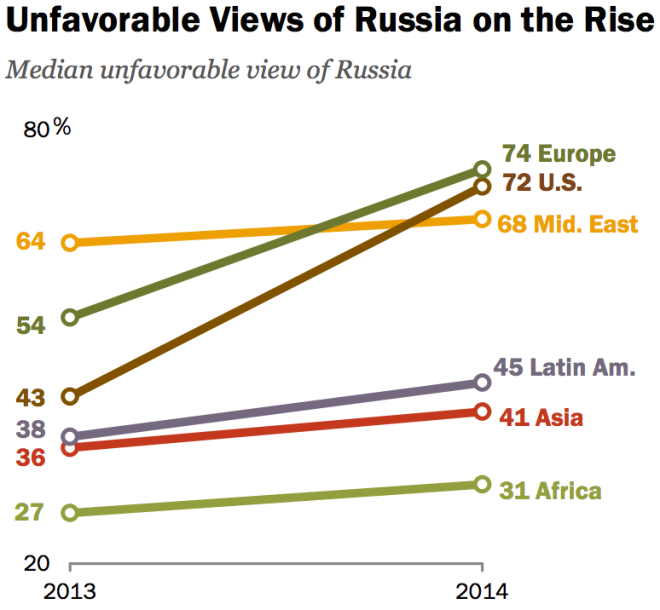Yesterday, Europe and the US announced new sanctions against Russia. Obama explains the gist:
The Cable summarizes the news:
The new European sanctions go further than ever before but still fall short of the type of “sectoral sanctions” that would block business with entire Russian industries. That reflects EU leaders’ concerns that hitting Russia too hard would also hurt their own companies and industries. The arms embargo, for instance, doesn’t apply to existing agreements. That means the $1.6 billion French deal to sell Mistral warships to Russia, which had come under fire from British officials last week, will be allowed to go forward, though France has said it will only deliver the first one while re-evaluating whether to also deliver the second.
That’s not the only sacred cow left untouched. While the new coordinated measures target future oil production, they don’t touch the natural gas business, a pillar of Russia’s export economy and a lifeline for Europeans. Both the United States and Europe took steps to restrict trade in key oil industry equipment needed for extracting oil from deep waters, in the Arctic, and from shale — all areas where Russia hopes to boost its oil output in years to come. The U.S. Commerce Department said it will limit the export of crucial oil technology to Russia, but it is not yet clear exactly what goods and services will be banned, how that will affect Russia’s current oil production, or even how much U.S. and European firms will be hit by export bans on certain oil projects.
Robert Kahn foresees “inexorable momentum for further sanctions”:
(1) Europe now is less of a constraint on further U.S. action; (2) Ukraine is achieving success on the battlefield, and without intensified Russian involvement would likely see further gains. If recent evidence of Russian shelling across the border is any indication, Russia has intensified its support in response to developments on the ground, which is justification for further sanctions; and (3) sanctions are likely to be extended over time in response to evasion. This last point is often unappreciated.
As with capital controls, prohibitions on financial transactions create incentives to innovate to evade the control. In some cases, that can be a helpful escape value, but in this case, where the West desires to impose a credible cost on Russia for its continued destabilization of Ukraine, controls need to be extended. If the restrictions on new debt, for example, are evaded in size by using non-sanctioned companies or alternative markets (such as foreign exchange swap markets), I’d expect the types of transactions and/or sanctioned institutions to be extended to close off those flows. This may be only the early innings of the sanctions game.
Yglesias unpacks the EU’s sanctions:
Russia’s export economy consists overwhelmingly of fossil fuels. This sector is Russia’s greatest point of vulnerability, but it is also the most costly sector for Europe to target since Europeans enjoy burning Russian oil and natural gas.
The EU is going to halt the export of certain categories of equipment and technology that are used in fossil fuel extraction. Europe will not target the natural gas sector, but is going to implement restrictions on the sale of equipment used in deep-sea drilling, arctic exploration, and shale oil extraction.
This won’t put much short-term pressure on the Russian economy. What it will do, however, is possibly divide the Russian elite. The long-term financial prospects of the Russian oil sector depend on its ability to continue pressing into new sources of oil. The imposition of this kind of sanctions could turn Russian oil barons into a constituency for a more restrained foreign policy. There is nothing concrete at stake in Ukraine that is nearly as valuable as tapping Russia’s own offshore and shale reserves.
But Julia Ioffe fears a cornered Putin is a dangerous Putin:
This is Putin today: a brash and unpredictable man backed into a corner with little, if any, way out. And it’s not a good Putin to be faced with.
His whole image mirrors that of the Russia he’s tried to create since he came to power in 2000: sovereign, strong, and unbowed by Western heckling. Putin, like the Russia he leads, likes to make decisions on his own terms. And he may very well lash out if the West demands he come out of that corner with his tail between his legs. This causes him to dig in his heels and resist at all costs, or to lash out. Because Putin, and Russia, do not follow commands, and they do not dance to the beat of Washington’s drum.
“Putin backed into a corner is not a great outcome for the West,” says Masha Lipman, a prominent Russian political analyst. She points out that boxing in the hard-to-predict leader of a massive military and nuclear power that has its fingers in various geopolitical pies that are of interest to the U.S. is quite risky. Will Russia retaliate by scuttling Iran talks? By forging a closer bond with China? And what will it make him do in Donetsk?

